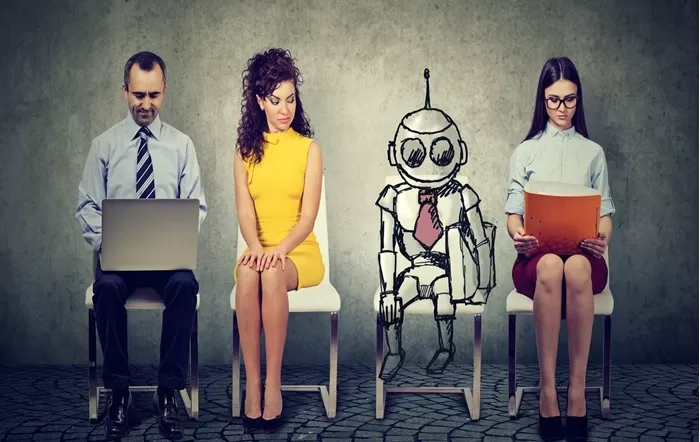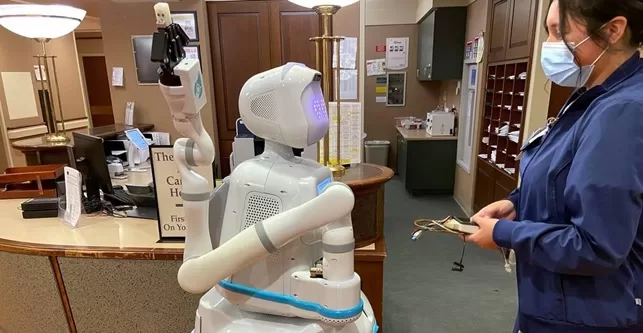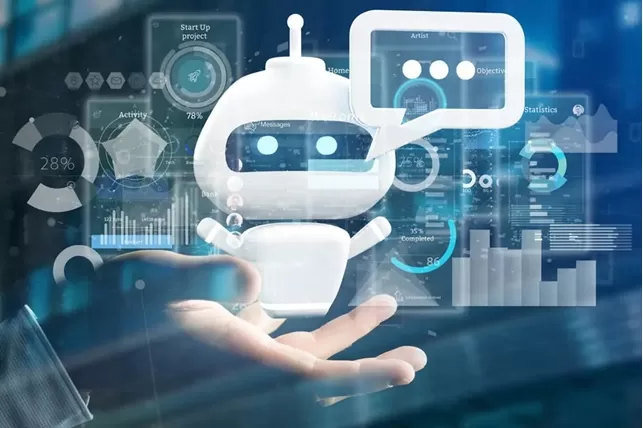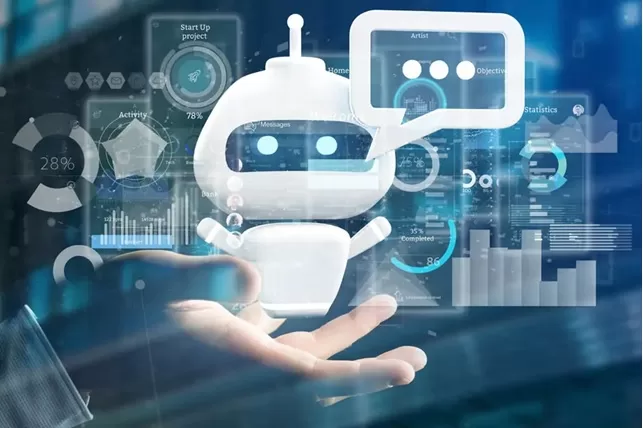Technology
From Sci-Fi to Reality: Jobs Created by AI and Seven Future Roles

Are robots coming for our jobs? The rise of artificial intelligence has triggered a wave of concern that machines will completely replace human labor in certain fields. But this is not a new phenomenon – throughout history, we’ve seen people fret about the impact of technology on their livelihoods, for example, the Luddites in the 19th century or mid-20th century secretaries.
While it’s true that people can sometimes get carried away with worrying about change, there’s no denying that AI in recruiting and workflows has already transformed the business landscape. Let’s take a closer look at how AI shapes the future of jobs.
The impact of smart technology on the current job market
The proliferation of AI software has left an indelible mark on the workforce of numerous industries. As cutting-edge fields like data science and machine learning continue to burgeon, they have spawned a slew of new jobs. At the same time, powerful intelligent tools created by custom software solution development companies have also transformed many traditional roles.
From assembly lines to generative art, innovation has penetrated virtually every sector of the economy and human activities, sparking concerns that machines will soon replace human workers en masse. But technology is not a panacea for all tasks, and there will always be a place for human expertise and ingenuity.
The effects of technological advancements on employment can be neatly classified into three overarching categories:
Job displacement
The rise of AI software has led to a significant displacement of workers whose jobs consist of monotonous and repetitive tasks. This includes positions in customer service, manufacturing, and assembly lines, among others. According to the forecasts given by McKinsey & Company, by 2030, between 400 and 800 million people worldwide could lose their jobs because of automation. But no matter it has streamlined many industries, not all roles are vulnerable to displacement by robotic mechanisms and smart tools. Certain professions still require the unique skills and decision-making abilities that only humans can provide.

Job enhancement
Thanks to robust software, certain professions have been able to take their expertise to the next level. By leveraging pioneering diagnostic tools, doctors can provide more accurate diagnoses, leading to better treatment and outcomes for patients. Meanwhile, marketers can target their advertising campaigns with extreme precision, thanks to AI’s ability to parse massive amounts of data and glean insights that would be impossible for a human to discern. However, successful professionals will need to strike a balance between embracing innovative digital tools and relying on their own unique expertise to drive remarkable results.

Job creation
In response to our ever-growing dependence on intelligent software, there has emerged a new breed of jobs. These positions require specialized skills and knowledge, and they offer unparalleled opportunities for professional development and growth. Such positions as prompt engineer, AI trainer, AI auditor, AI ethicist, and machine manager are enjoying increasing demand.
But not everyone is cut out for such a career. These jobs require a unique blend of technical expertise, creativity, and strategic thinking that can be difficult to master. But for those who are up to the challenge, the rewards can be substantial, both in terms of job satisfaction and financial compensation.
According to the World Economic Forum, the evolving distribution of work between humans and machines is predicted to result in the displacement of 85 million jobs and the creation of 97 million new positions better suited to the new working conditions, by the year 2025.
Statista gives the following figures for the year 2022: 2.3 million created and 1.8 eliminated positions (see the picture below).

Leveraging the potential of AI: jobs where technology is of great help
Jobs where AI is of extreme importance are numerous. Nowadays, it’s hard to say which ones actually wouldn’t profit from innovative technologies at all.
Creative jobs
AI will shape the future of work across many fields, but art is not one of them. The reason being, humans possess the skill of creativity and out-of-the-box thinking, which enables them to produce exceptional pieces of art from imperfections and blunders, which technology lacks. Nevertheless, professionals in the creative industry can incorporate technology to enhance their work. Copywriters and journalists can leverage it to streamline their work process and generate captivating content, such as enticing advertisements, blog articles, and headlines. Translators can greatly benefit from additional tools when dealing with huge amounts of text. However, individuals must remain in complete control of the process and choose what best suits them. Despite this, when it comes to producing full-fledged artworks such as movies, plays, and paintings, smart technology is unlikely to compete with human creativity.
It’s clear that in the future, AI will still influence jobs in this area.

Healthcare professions
Smart technology has become an increasingly valuable asset in diagnosing and treating a wide range of diseases. An example of its application is the detection of diabetic retinopathy, where a robust digital system can quickly identify visual signs and use an algorithm to produce a binary diagnosis within a few minutes.
The data obtained from smart algorithms can provide medical professionals with valuable insights to diagnose diseases faster and explore innovative solutions. Therefore, it is essential for healthcare providers and specialists to adopt and implement these technologies to improve patient outcomes.
AI and the future of work in the healthcare sector is a promising topic. Now, we can only guess what’s ahead in this industry.

Positions implying problem-solving tasks
These are jobs for individuals with an innate ability to manage people, events, and processes to achieve positive outcomes. However, for those lacking in this inherent skill, it is essential to develop ingenuity and problem-solving skills. In today’s world, they are in high demand, requiring professionals who can harness information and knowledge to solve problems and engineer efficient solutions. Occupations that need advanced mental capacities include computer system analysts and air traffic controllers, for instance.
While technology is capable of computing figures and providing swift solutions in no time, human intelligence is still necessary to complement this feature. Say, training a machine to identify the shape of a bird or a butterfly requires numerous images. But even the most sophisticated machines can become confused when tasked with selecting between a picture of a bird-shaped cloud and a real skylark, highlighting the need for human reasoning.

AI-powered jobs of the future: seven emerging career paths shaped by technology
While the concept of machines taking over human positions is a concerning one, it is important to remember that they will not completely replace us. Of course, AI will reimagine future jobs and roles, but to some extent only.
As Tech Republic reports, artificial intelligence has led to the creation of three times more jobs than it has replaced. Bearing this in mind, let us examine some of the AI-created jobs.
Data annotation specialist
Have you ever pondered over the ways in which ML algorithms are advancing by the day? It all boils down to the extensive amount of annotated data being fed into the system, which teaches machines to identify everything in their surroundings. This procedure means meticulously labeling all the elements in raw data that you wish the machines to recognize. The need for individuals who can provide such services, be it video annotation or any other form of annotation, is rapidly growing.
Creating and improving ML algorithms is already a time-consuming task, and businesses simply cannot afford to annotate the massive volume of graphic or video files. So, it’s time for data annotation experts to join the game, playing a pivotal role in a project. If data is not labeled accurately, the entire project may be delayed, and one might have to start from scratch.
AI ethicist
This AI-powered job implies tackling the ethical dilemmas and moral implications surrounding the development and application of AI. These experts ensure digital systems are designed and used in accordance with ethical values, such as justice, transparency, respect for privacy, and accountability. They work closely with software developers, data scientists, and policymakers to identify ethical issues and propose solutions that safeguard the interests of users and society as a whole. Typically, such experts have a background in fields such as philosophy, computer science, law, or social sciences.

Ethical sourcing officer
Many companies are still grappling with diversity concerns, and they are actively seeking individuals to ensure that all genders and ethnic groups are adequately represented. This has given rise to the role of an ethical sourcing officer who monitors company demographics and oversees the recruitment process. Given that this can be an arduous and time-consuming task, video annotation can be a valuable tool for keeping track of individuals who attend interviews and ensuring that every demographic group is fairly represented. For anyone looking to effect positive change and rectify the imbalances that persist in numerous companies, this is an ideal position. Being perfectly aware of AI potential, recruiting forces will seek such specialists.
Data detective
If you find solving mysteries in the Sherlock Holmes manner exciting, then a position as a data detective could be an ideal career path for you. It is one of the most striking AI jobs of the future. You could begin by offering video annotation services, where you would be responsible for labeling all the objects in each frame that ML algorithms will utilize to detect evidence, clues, and suspects. Eventually, you could progress to more advanced roles, working with AI to scrutinize data and leveraging it to eliminate potential suspects.
Business development manager with the knowledge of modern smart tools
Despite the widespread acknowledgement of the vast impact of AI on future jobs, businesses operating in various fields remain hesitant to integrate it into their workflows and services. Essentially, while intelligent software is impressive, it cannot market itself as it is just too complex. Hence, there is a growing demand for individuals who can sell the concept of AI to enterprises and SMEs seeking to gain a competitive edge. This presents a fantastic opportunity for tech enthusiasts who aspire to engage with cutting-edge technological advancements without being involved in the actual product development process.

Digital health coach
A health advisor with perfect command of modern technologies is another AI-driven job of the future. As we move forward, people’s schedules will become even more jam-packed with work and other commitments. As a result, they will seek new alternatives to traditional methods of working out (visiting a gym or consulting a personal coach). They would rather rely on wearables to track their state and enlist the services of a digital health coach to analyze this data and provide motivation to improve their lifestyle choices, eating habits, and overall physical activity levels.
Chatbot designer
Have you ever had a conversation with a computer program that seemed so human-like, you almost forgot you weren’t talking to a real person? That’s the magic of chatbots, and behind each of them is a skilled chatbot designer. These experts use their creativity and technical know-how to craft software solutions that can interact with humans through messaging platforms, websites, and mobile apps. They work hand-in-hand with clients and stakeholders to understand their business goals and create digital tools that can streamline customer service, sales, and marketing. With a background in computer science, software engineering, or user experience design, chatbot designers are the masterminds behind the ongoing revolution.

AI and the future of work
AI jobs of the future are numerous. As we look ahead, it is clear that technology will continue to revolutionize the way we work and live. While there are concerns about job displacement, it is important to recognize that technology also creates new opportunities and job roles that require a unique set of skills.
As we adapt to present-day changes, it is crucial to prioritize continuous learning and upskilling to remain competitive in the job market. AI in recruiting will play a significant role – both as a tool for hiring experts and a technology one must master. By embracing pioneering innovations and combining them with human intelligence, we can create a future where machines and humans work together to achieve even greater things.

















































